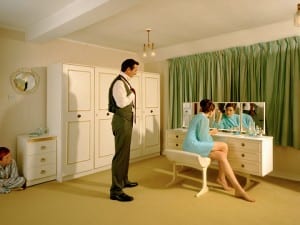Leeds International Film Festival returns in 2008 for its 22nd year from the 4 – 16 November. It is the largest annual film festival outside of London and over 13 days it brings the world of film to dozens of venues, taking it out of the traditional setting of a cinema and into bars, art galleries and theatres. Under the direction of Festival Director, Chris Fell, LIFF focuses on showcasing films from across the world that you won’t see in your local multiplex, with their homogenised Hollywood studio offerings. Instead LIFF acts as a beacon for independent film and offers attendees the chance to watch over 350 films from around the globe.
In his tenth year as Festival Director, Fell is introducing some intriguing new aspects to the Festival. “I worked at the Bradford Playhouse and Film Theatre and I became very interested in film there. They showed films that you couldn’t really see anywhere else and ever since I have tried to bring audiences films that they cannot see in their normal cinema. Festivals are great for this as they bring films in from around the world and this is what Leeds International Film Festival does.”
LIFF’s programme is extensive, focusing on international cinema and it aims to extend film across the city. Fell and his dedicated team spend time researching what films are being made at present and combining these with archive films. They attend film festivals including Rotterdam and Cannes to see what films are being shown on the festival circuit. “We get 2,500 films sent to us from around the world by independent filmmakers for us to consider. The programme develops from many varied sources.” The programme is divided into six distinct sections, the Official Selection, Fanomenon, Short Film City, Cinema Versa, KINETIKA! and Thought Bubble.
This year LIFF introduce a new element to the Festival, ‘Short Film City’, which focuses on the art of short filmmaking. “Leeds is the place where the French inventor, Louis Le Prince made his short films in 1888 and they are the first ever moving images filmed. No one really knows that they were filmed in Leeds and so we wanted to revive his reputation through a new programme of short film. We also want to give short film a big stage and so we are using venues around the city, both indoor and outdoor to showcase these films, as some of the short films we have seen are amongst the most exciting films being made at the moment.” Due to an increase in the availability of filmmaking technology and distribution channels for film such as YouTube mean that more films, in particular short films are being made than ever before. “There are disadvantages as a lot more bad films are being made too. People still aren’t working out how they can make something that works with audiences, or be different. There is a lot of potential and we want to use Short Film City so that people can see the amazing things that are being made around the world and hopefully to be influenced by them and learn from them too, as well as being entertained by them.”
One of the programmed short films this year is, Carretera del Norte (Northern Highway — Mexico, 2008) directed by Rubén Rojo Aura. This exemplifies LIFF focus on international films as it tells the story of a very poor family who survive in the Mexican desert, selling animals at the border of a highway. The struggle to survive makes everyone more selfish and will lead to a highly unexpected end.
Cinema Versa features documentary films, which examine cultural diversity in order to create debate and challenge views and ideas about the world we live in. Two major themes highlight music and human rights. “The music films are shown in a lot of clubs and bars and tend to be feature independent bands. We are increasing our partnerships with organisations like Oxfam to present the latest documentaries about human rights abuses or about significant problems in the developing world and Leeds is getting a really good reputation for showing these films, which are the most important films being made at the moment alongside outstanding fiction. A lot of the documentaries don’t get shown in other cinemas or festivals, so Leeds is helping them get a platform and gain audiences in this country and to get attention for the issues that they are focusing on.”
The innovative programme and inclusive ethos at LIFF has meant that they have consistently showcased experimental and avant-garde films. KINETIKA! is the dedicated section of the Festival and this year focuses on artists filmmaking collectives in Europe who work together closely to make experimental films as a group. “Martha Jurksaitis, KINETIKA’S programmer is passionate about collective filmmaking and she has been focusing on collectives in Germany where it happens a lot. Martha is bringing over filmmakers and their work to talk about how they have done it and how more groups in the UK could do it too.”
Fanomenon and Thought Bubble are two aspects of LIFF that are intrinsically linked. Thought Bubble showcases comics and graphic novels — featuring both Manga and Western work. There are special screenings, panel discussions and workshops. Fanomenon features fantasy, sci-fi and horror films including surreal fantasies from Japan and South Korea, which have heavily influenced American filmmakers. These are broad and fan driven events attracting thousands of comic book fans from across the country.
As part of LIFF’s all-inclusive philosophy they support and nurture new international filmmaking talent, this is demonstrated by the Golden Owl Competition as part of the Festivals Official Selection. The competition is devoted to directors who haven’t been supported much in the UK. They show around 15 feature films from around the world, all of which are UK premieres. “Each year the competition keeps gaining more attention from audiences. They enjoy taking risks and are surprised by the films that they see. We showed an Australian film called, Noise (2007) last year no one had heard of it before. Over the course of the Festival we had nearly one thousand people coming to see it over various screenings. We were really excited about Noise and it wasn’t being supported by any other festival, or cinema in the country and we showed people what they were missing from seeing films on a normal basis at a multiplex. The audience see the competition as a symbol of what the Festival is about.” The rest of the Official Selection is previews of films, which are coming out over the coming months from British and international filmmakers. “We don’t tend to show the big studio films. We support films that are not given any attention by the press, but still deserve to be shown in cinemas. Last year at our opening gala, Persepolis (2007) was shown. At the time Persepolis was not getting much press attention, but by featuring it as our opening film to give it a big profile it ended up with lots of attention from Yorkshire TV, radio and newspapers and it won our Audience Prize at the end of the Festival.”
From filmmakers to film lovers — LIFF has something for everyone in its eclectic and pioneering programme showing high quality films, which reflect global views and bring an international perspective to Leeds. “We want to have an impact on audiences all year round to make an impact on the choices that they are making. So if they decide to go to the cinema or rent a DVD to take more risks and not see a studio film, but try out a new filmmaker and realise that there is far more out there to be experienced and there are an incredible amount of great films that deserve to be shown beyond those narrow choices exist in multiplexes and through the media these days. The more that people do that then the more independent films will be released in this country.” The Leeds International Film Festival is an inspirational event that is not to be missed.
Shona Fairweather
Credits
1. Rubén Rojo Aura.





